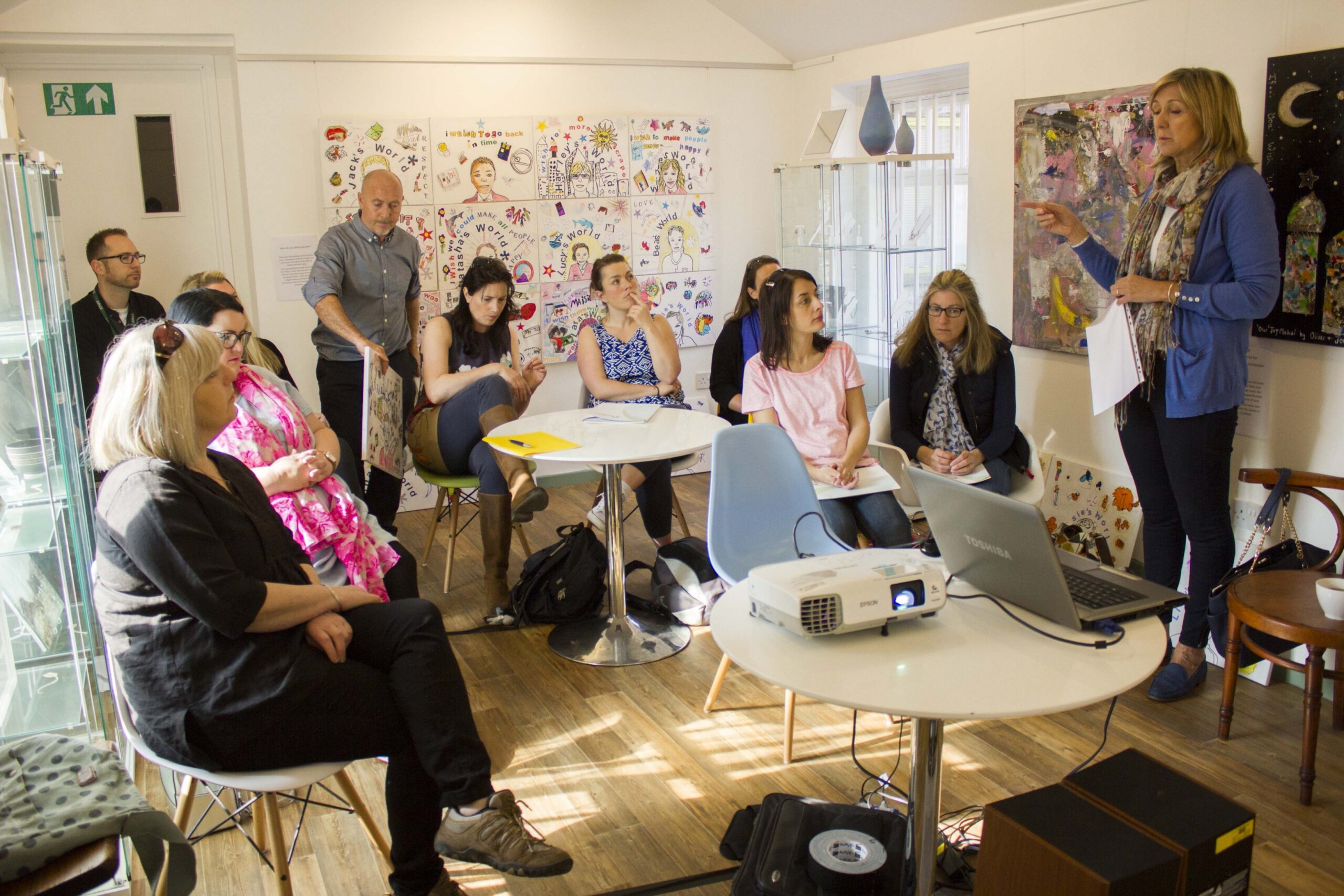
A workshop for SLiCE fellows
Advocates for cultural education
Teachers in the north west of England are making notable inroads as advocates for the arts in schools. Jude Bird describes the SLiCE programme.
Curious Minds, the Bridge organisation for the north west of England, has developed a programme called Specialist Leaders in Cultural Education (SLiCE). Our aim has been to build a strong and knowledgeable group of teachers who are articulate advocates for the arts and can be deployed into other schools to identify and support new cultural champions, and work with cultural organisations to create new and collaborative models of working.
Derri Burdon, our Chief Executive, says: “We want teachers and young people to know that arts and culture offer very viable career paths as well as ways in which children and young people can access their own creative and educational potential.”
Schools are evidence and impact-driven so it was useful to identify processes that needed to be in place before, during and after a visit from a cultural organisation
There are 22 days each year when the SLiCE fellows are ‘brought out’ to undertake a placement in a cultural organisation and then deliver a piece of action research based in cultural practice. This includes delivering continuing professional development (CPD) for peers, offering school-to-school support and having an input into initial teacher training. They are part of a growing network which enables them to share practice, reflect on their learning and benefit from the support of peers.
In the first two years of the programme we have worked with ‘SLiCEs’ in over 30% of the teaching school alliances in the north west region. In turn, they have worked with over 200 schools and 40% of the national portfolio organisations (NPOs) in the region. In the second year of the programme the returning schools have collectively invested over £100k of their own resources into cultural education.
The SLiCE role enables teachers to have time and support to develop their skills in communicating to wider audiences, organising complex teams, motivating peers and colleagues, and developing as recognisable champions of culture within their alliances and with cultural partners. The SLiCEs report high levels of commitment from schools within their alliances, which have contributed to curriculum development and increased inter-school planning and delivery. In many cases this has resulted in influencing policy and practice.
Last year one of the pieces of research undertaken by a SLiCE looked at what needed to be put in place to maximise the benefits and impacts for schools and cultural partners working together. Schools are evidence and impact-driven so it was useful to identify the processes that need to be in place before, during and after a visit from a cultural organisation. Teachers in the eight participating alliance schools said that they wanted a cultural visit to have an impact on standards to meet whole school targets. Good planning, bespoke sessions and a clear structure were the initial requirements of the teachers.
Conveying this to the cultural partner underpinned effective working as expectations were clear from the outset. Visits where teachers and support staff actively engaged as co-learners with the children were seen by cultural organisations to be the most productive. Where follow-up work took place it has offered continuity and, in this way, sustainable partnerships and trust have been built. The schools devised a checklist to make sure that their findings and learning were captured to feed into future cultural visits. Using action research enables a group of schools to test out practices for the benefit of their whole alliance and beyond.
Sally McFarlan, Headteacher of Ladywood School in Bolton, said: “The SLiCE programme has huge potential to impact on schools and pupils in the area of cultural development. Having a specialist in this area within our teaching school alliance means that we can directly support and extend the cultural offer within our own school, in schools across the alliance, and in the longer term across the system as a whole.”
Kathryn Quigley, a SLiCE fellow, said: “The SLICE role has enabled me to validate the work that artistic and cultural organisations can bring to the education sector and be beneficial to each other. It has been invigorating and has re-established the importance of arts and culture to many in our teaching school alliance.”
Research and evaluation for the first phase was undertaken by Sandra Hiett and Elizabeth Smears. Their key findings demonstrate that the SLiCE fellows were able to develop as brokers between schools and cultural organisations, greatly increasing access to cultural education and resulting in increased levels of pupil participation, improved behaviour, and raised levels of motivation and achievement. Cultural organisations cited the importance of a skilled and dedicated contact within schools. Such partnership-working, focused on cultural education, reinforced the benefits of giving children first-hand experiences outside the classroom.
Natalie Diddams from the Royal Exchange Theatre in Manchester said: “Working on the SLiCE programme has been great news for us. It has given us the space and time to plan and deliver a tailored programme of CPD, which will now feed into all the work we do with teachers. Our partnership with the Tate Liverpool has also invigorated our plans for the future – showing us new and exciting ways of working with other arts organisations and with schools.”
One of the key goals in the Warwick Commission report is for “a world-class creative and cultural education for all to ensure the wellbeing and creativity of the population as well as the future success of the Cultural and Creative Industries Ecosystem”. School-led approaches such as SLiCE are helping to reposition cultural education within the new educational landscape by locating schools as key players within the local cultural ecology to support this national goal.
Jude Bird is Head of Education Partnerships at Curious Minds.
www.curiousminds.org.uk
E [email protected]
Join the Discussion
You must be logged in to post a comment.